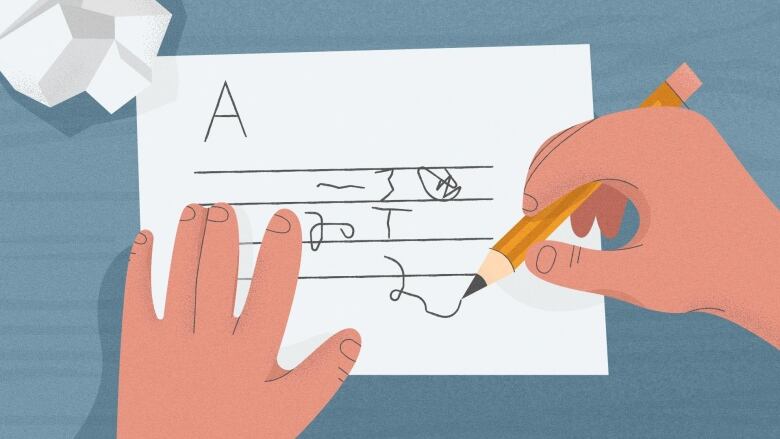COVID has created an early education pandemic that school boards are ignoring
We could be on this journey for years with learning gaps widening for our most impressionable minds

This column is an opinionby Andrew Dias, afather of three children fromMississauga, Ont.For more information aboutCBC's Opinion section, please see theFAQ.
Pandemic schooling has created acute learning gaps that school boards are ignoring.
My six-year-old son entered Grade 1 this year at the learning ability of junior kindergarten. He was four when his school closed due to the pandemic, which was the moment my wife and I discovered how online learning doesn't work with kindergarten-aged students. He needed essential play-based learning that in-person kindergarten or daycare provide as a foundation for key literacy and math skills.
Unfortunately, daycares couldn't take him because he had been in the school system. So, we tried to home-school him while working from home with two other children in the house. That didn't go well.
Schools in Ontario have had the longest pandemic school closures of any province in Canada, and our son subsequently lost his formative education and developed a learning gap as a result. He's now expected to function at a Grade 1 level with no adjustment in the school curriculum.
Like most of his classmates, he can't form letters or do simple calculations expected of his age; yet our education system is seemingly stepping over this puddle in elementary education without a second thought. This learning gap exists writ large for hundreds of thousands of our youngest school students, right across the country, and has become an unspoken pandemic in elementary schools for the 2021-22 school year.
Getting support acrapshoot
My wife petitioned the school to solicit help for our son's learning and behavioural challenges developed during the pandemic. He got the extra support he needed thanks to a proactive mother, an experienced teacher, and a competent school. But this method is a crapshoot.
Thankfully, schools have remained open since September. But are we prepared to criticize the education system when we are scared to jinx it? The nightmare of working from home with our children en casa is still very raw, and perhaps the relief is clouding our judgment.
Those kids who can catch up will. But what about those who can't? They'll underperform through elementary school and maybe high school. What about children who've developed mental health challenges throughout the pandemic, like my son, which inhibit their ability to learn? Are they fated to spend their K-12 education undergoing a progressive erosion of confidence and self-esteem that may eventually overshadow their career prospects?
Our youngest students deserve an education system that owns this problem now, rather than years from now. This pandemic isn't over, and it's not unfathomable that schools could shut for another semester, switching back to the online model of disengagement that exacerbates learning loss.
We could be on this journey for years with learning gaps widening for our youngest and most impressionable minds. Teachers and schools are not responsible for this. They are frontline service providers doing their best under inconceivable pressure. It's the executive system of education that contains the fault line, whether it admits to it or not.
Entire generation at risk
Under the Education Act in this province, the Ministry of Education is mandated to ensure all "exceptional" children have appropriate special education available to them. School boards are tasked with providing these programs and services to students "whose behavioural, communicational, intellectual, physical or multiple exceptionalities are such that he or she is considered to need placement in a special education program."
This definition presently refers to an entire generation of children, especially the youngest among them.
Our education system is slow to move at the best of times, but now requires a wartime effort of agile innovation and focused urgency to mobilize adjusted education for children during a once-in-a-century pandemic. Let's not forget that it was an assembly of concerned pediatricians from SickKids Hospital, posting open letters to the Ontario government, which reopened schools in September.
That concerted effort requires forward motion by school boards and teachers' unions across Canada to lobby provincial governments to amend the curricula, increase funding for learning recovery, and flow this into schools so that it's visible and readily accessible.
If decision-makers can't or won't amend curricula in elementary schools, then place teaching support in every Grade 1 classroom to address the shortfall. Because if a course correction doesn't arrive soon, this problem will accumulate and intensify like the virus that caused it.
Like with anything in life, if you ignore a problem, it ends up causing more damage and costing more money assuming that you can still fix it at that stage.
Do you have a strong opinion that could add insight, illuminate an issue in the news, or change how people think about an issue? We want to hear from you. Here'show to pitch to us.












_(720p).jpg)


 OFFICIAL HD MUSIC VIDEO.jpg)
.jpg)



























































































